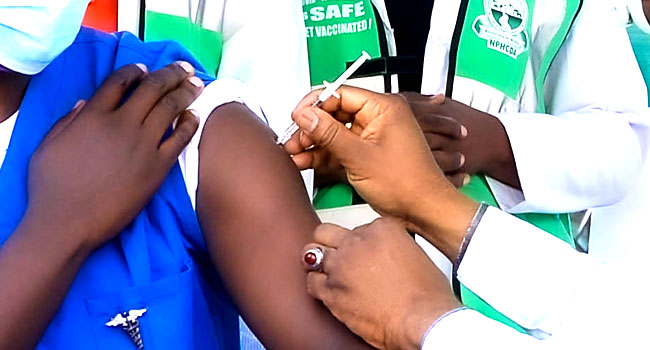Taraba Receives More COVID-19 Vaccines, Immunises Almost All Health Workers

![]()
The industrial action by the organised labour and resident doctors in Taraba in the time past has hampered the resolve of the state government to meet its target of vaccinating over 50,000 people against COVID-19 in the state.
Mr Hassan Mafindi, the Executive Secretary of the State Primary Health Care Development Agency, told reporters on Monday in Jalingo, the state capital that they have so far vaccinated over 23,000 residents.
He disclosed that the state has received 40,020 more doses of the Oxford-AstraZeneca vaccines from the National Primary Health Care Development Agency, in addition to the 56,250 doses earlier received.
The agency boss stated that not until the first phase of the vaccination was over, they cannot commence the second phase.
He said frontline workers in all facets of human endeavour would be considered because about 90 per cent of the health workers in the state have taken the vaccine jab.
“The factor for the second jab is the completion of the first batch of the vaccination and also for people that have been able to access the first jab.
“As I speak to you, we are no longer talking about frontline health workers but frontline workers because we have successfully vaccinated over 90 per cent of our health workers and what our target is now are the frontline workers, who include media workers, drivers, teachers, lecturers, and others,” said Mafindi.
He, however, decried that some residents have developed a nonchalant attitude towards their health by refusing to observe the non-pharmaceutical measures against COVID-19.
“People mingle freely without taking cognisance of the use of facemasks and other safety measures. We need to be proactive in dealing with COVID-19 – it is a pandemic and not an endemic.
“We have seen what is happening in India and other countries where lives are lost as a result of the ailment and none of us would like to have a similar scenario in our country and for us to achieve that, we need to adhere strictly to the non-pharmaceutical approach,” he health agency boss said.
He added, “It is not cost-effective and we as an agency will continue to educate our people at different levels to ensure compliance.”


